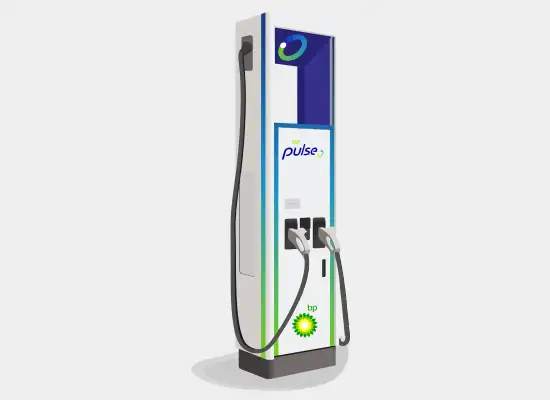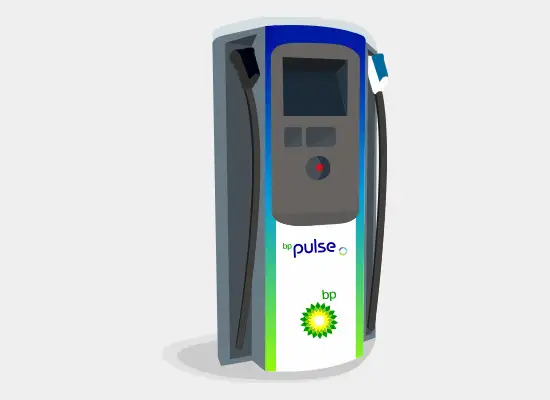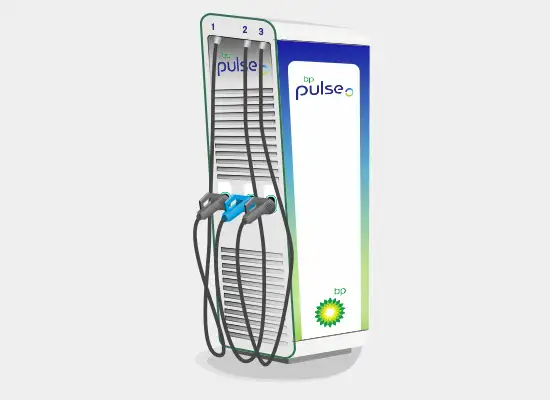Our bp pulse app lets you find available charging points across the UK.
Plug into fast, rapid and ultra-fast chargers in ultra-convenient locations. Whether you’re shopping for groceries or staying in a hotel—just plug in, power up and go.
Find your nearest charging station
Discover onsite amenities, charger availability and get directions to your nearest location

*Payment by bp pulse charge card or via bp pulse app is required. Discount not available on non-participating chargers. Rates & average subscriber savings are subject to change and can vary across the bp pulse network – check the app for latest prices.
**1 month's subscription free. When you update your account and keep your bp pulse subscription (£7.85 inc VAT per month) on our upgraded app network.
Get your membership started with the bp pulse app
Simply get the app below. Upgrade to a full membership subscription to get our very lowest on the go prices.


Discover our latest bp pulse charging sites
4 payment options
Choose how you pay
Paying is as easy as 1,2,3. If you need to charge more or less often, simply change the way you pay so you’re always good to go.
Subscriber
Save over 20% on our Contactless rates when you download the bp pulse app and pay £7.85 per month*. Plus, get your first month free** - as well as a handy bp pulse charge card to start and stop charging.
Pay as you go
Sign up to bp pulse app to access our second lowest on-the-go charging rates. Simply download the bp pulse app and add your preferred payment method. All customers can now order a free bp pulse charge card to start charging!
Contactless
Using a rapid or ultra-fast charging point? We accept payments from contactless bank cards, as well as contactless mobile payments such as Apple Pay or Google Pay. Not available on 7kW charging points.
Pay online
Prefer a completely anonymous charge? Visit our live map online, select a charging point and pay for a charge by entering your credit or debit card details.
Our pricing
Whether you need a speedy charge or are stopping for longer, our on the go network offers a range of options to keep your EV charged and help you get back on the road when you want to.
bp pulse 150kW
Capable of charging at speeds of up to 150kWh and being rolled out on bp forecourts across the UK
Subscriber:
£0.69/kWh
Pay-as-you-go:
£0.87/kWh
Contactless / Pay online:
£0.89/kWh
bp pulse point 150kW
New battery power charging facility. Capable of charging at speeds of up to 150kWh. Found on bp forecourts across the UK.
Subscriber:
£0.69/kWh
Pay-as-you-go:
£0.87/kWh
Contactless / Pay online:
£0.89/kWh
bp pulse 43kW/50kW
Anyone can charge here, including bp pulse subscribers, pay-as-you-go customers and guests.
Subscriber:
£0.63/kWh
Pay-as-you-go:
£0.83/kWh
Contactless / Pay online:
£0.85/kWh
bp pulse 7kW
Anyone can charge here, including bp pulse subscribers, pay-as-you-go customers and guests.
Subscriber:
£0.44/kWh
Pay-as-you-go:
£0.65/kWh
Contactless / Pay online
£0.65/kWh

Fast, Rapid and Ultrafast – what to know
Fast: We use ‘fast’ to describe our 3kW AC, 7kW AC and 22kW AC chargers
Rapid: Our ‘rapid’ range includes 49kW AC, 50kW DC and 75kW DC chargers
Ultrafast: Enjoy charging power of up to 150kW or 300kW with our ultrafast chargers
Charging power depends on a range of factors, including your vehicle make and model, temperature, and how full your battery is (known as the ‘State of Charge’, or SoC). Find out more about some of the factors that can impact the power a charger can deliver in our handy guide.

We’re on the pulse, 24/7
New to electric car charging? Check out how to use our public charging points
Charging your electric car is as easy as charging your phone. Watch the videos below to get the lowdown on how to use our bp pulse150, bp pulse50 and bp pulse7 chargers.

How to use a bp pulse150
Watch the video
How to use a bp pulse50
Watch the video
How to use a bp pulse300
Watch the videoEnjoy 50% off hot drinks at Wild Bean Cafe

Charging your EV on the go? Enjoy a discount on Wild Bean Cafe hot drinks at participating branches
We’re offering 50% off all Wild Bean Cafe hot drinks when charging your vehicle at a bp pulse charger at any participating bp owned and operated petrol station*. So, whether you’re shopping for groceries or visiting friends, plug in and enjoy a range of hot drinks in any bp standard size—including specialist drinks**.
*One drink per charge per visit. Subject to availability. **Speciality and decaffeinated drinks sold in participating sites only. Additional terms and conditions apply.
Frequently asked questions about charging on the go
Yes you can. The bp pulse network has charging points across the UK. Check out our live map to find your nearest available bp pulse7, bp pulse50 and bp pulse150 points and simply plug. pulse. play.
In short, it depends.
The speed of charging is determined by the power of the charge points (7kW, 50kW or 150kW), but in principle, the more powerful the charging point, the shorter the charging time. Charging time will also depend on your vehicle’s battery size and your vehicle’s charging capacity.
With a bp pulse subscription you can enjoy our best value on the go tariffs to charge on the bp pulse network, starting from £0.44/kWh to use our AC7kW charging points, £0.63/kWh to use our AC43kW or DC50kW charging points, or £0.69/kWh to use our DC150kW charging points and above.
Subscribers pay £7.85 (inc. VAT) per month to access our lowest on-the-go rates, and receive a handy bp pulse card that lets you start and stop charges with a single tap. Oh, and all new members get 1 month's free subscription.
Sign up to bp pulse app to access our second lowest on- the- go charging rates. Simply download the bp pulse app and add your preferred payment method. All customers can now order a free bp pulse charge card to start charging!
If you prefer to pay by contactless payment, such as a contactless bank card, or contactless enabled mobile device, rates are £0.89/kWh for our DC150kW charging points and above, or £0.85/kWh for our AC43kW or DC50kW charging points. Contactless is not available on our AC7kW charging points.
Prefer a completely anonymous charge? Pay as a Guest using our live map, online. Rates are £0.89/kWh for DC150kW charging points and above, £0.85/kWh for AC43kW or DC50kW charging points, or £0.65/kWh for AC7kW charging points.
For full details regarding pricing please visit our live map or our pricing page here.
Sometimes. If you’re using one of our standard or fast charge points (7kW) then you will need to take your own Type 2 charging cable with you. The cable will lock into place once you start your charge, so it can’t be removed while you’re away. You’ll be able to release it once you have stopped your charge.
You won’t need it if you’re using one of our bp pulse50 (50kW) or bp pulse150 (150kW) charge points.
When you’ve safely arrived at the bp pulse charging point you wish to use, connect your vehicle using your Type 2 charging cable, or the tethered cable provided.
Next, use the bp pulse app to start your charge.
Via Charge: Enter the charge point ID and click ‘Start Charge’.
Via Live Map: Find your charge point on the map, select it and click ‘Start Charge’.
You can also find a charge point by clicking ‘List’ on the map.
On our 3-7kW chargers, the lights next to the charging socket will turn green to indicate a successful connection.
On our 50kW+ chargers, the screen will show you the status of the charge.
When you’ve finished charging, click ‘Stop Charge’ in the app. It might take a couple of seconds for your cable to release.
Please don’t press the red emergency stop button unless there is a real emergency – this will disable the unit until an engineer is able to come to the charge point.
When you’ve safely arrived at the charging point you wish to use, connect your vehicle using your Type 2 charging cable or the tethered cable provided.
Tap your bp pulse access card on the target which will start the charge.
For our 50kW+ chargers, you might need to select which type of cable you want to use before tapping your access card on the target.
When you’ve finished charging, tap your access card on the target and disconnect your cable.
Please don’t press the red emergency stop button unless there is a real emergency – this will disable the unit until an engineer is able to attend to the charge point.
Here are some tips if you’re having trouble with your cable after you’ve finished charging:
1. Make sure you’ve stopped the charge in the app or with your RFID card.
2. Check the digital screen to make sure the charge point has recognised the charge has finished. If you’re using one of our 3-7kW units the lights will turn blue to indicate this.
3. Check whether your electric vehicle has a cable release feature. You should find details of this in the vehicle manual from the manufacturer.
If none of the above work, please call our 24/7 customer services team on 0330 016 5126 and we’ll do our best to help you.
Please don’t press the red emergency stop button unless there is a real emergency – this will disable the unit until an engineer is able to attend to the charge point.










